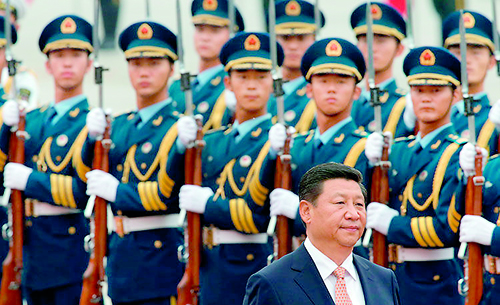Sunday Times 2
China’s Xi calls for stronger frontier defences: Xinhua
View(s):BEIJING, June 28 (AFP)- President Xi Jinping said China should strengthen its frontier defences on land and sea, state media reported today amid territorial disputes with neighbouring nations which have accused Beijing of being increasingly aggressive in pressing its claims.

Chinese President Xi Jinping inspects an honour guard at a welcoming ceremony for Venezuelan President Nicolas Maduro outside the Great Hall of the People in Beijing last year (Reuters)
Xi made the remarks at a “national meeting” on Friday also attended by Premier Li Keqiang and Vice Premier Zhang Gaoli, the official Xinhua news agency said.
In his remarks on the defence of China’s borders, Xi said the country’s weakness in the past had allowed others to bully it.
“Foreign aggressors broke China’s land and sea defence for hundreds of times, plunging the Chinese nation into the abysm of calamity, Xi added, calling on the people not to forget the history of humiliation and to build a strong frontier,” the report said.
“Xi urged China’s frontier defenders to meticulously monitor over and control the frontier and to mount actions to defend the country’s maritime right, while implementing an overall national security outlook.” The nationalistic-tinged comments reported by Xinhua are Xi’s latest calling for a tougher military stance.
Since becoming China’s leader during a once-a-decade power transition that lasted from November 2012 until March 2013, Xi has called for the country to boost its military into a force that can “win battles”.
Other officials, such as Foreign Minister Wang Yi, also stress that China will fiercely defend territory it considers its own, but insist the country poses no threat to others.
Xi’s reference to frontiers comes as China is engaged in occasionally tense maritime disputes over territory with Japan, the Philippines and Vietnam.
On land, China has a long-standing dispute with India. And Beijing has also blamed what it calls foreign-based “religious extremists” for fomenting terrorism in its largely Muslim far-western region of Xinjiang, which borders Central Asia.
China’s Communist Party leaders have for decades stressed that under their leadership that began in 1949 the country finally overcame more than a century of humiliation by outside powers dating back to the Opium Wars of the 19th century.
Under the last imperial Qing Dynasty, China also saw incursions by western powers and Japan that secured trade and legal concessions as well as control of territory seen in China as unfair.
References to national humiliations, such as the pillaging of the Old Summer Palace by a joint British and French military expedition during the second Opium War in 1860 and the suppression of the Boxer Rebellion in 1900 by a multinational force of Europeans, Americans and Japanese, are common examples.
| Japan set for landmark easing of constitutional limits on military
TOKYO (Reuters) – Japan is poised for a historic shift in its defence policy by ending a ban that has kept the military from fighting abroad since World War Two, a major step away from post-war pacifism and a big political victory for Prime Minister Shinzo Abe.  Japan’s Defence Minister Itsunori Onodera inspects an annual new year military exercise by the Japanese Ground Self-Defence Force in Tokyo (Reuters) The change will significantly widen Japan’s military options by ending the ban on exercising “collective self-defence”, or aiding a friendly country under attack. It will also relax limits on activities in U.N.-led peace-keeping operations and “grey zone” incidents short of full-scale war, according to a draft government proposal made available to reporters. For now, however, Japan is likely to remain wary of putting boots on the ground in future multilateral operations such as the 1990-1991 Gulf War or the 2003 U.S.-led invasion of Iraq, activities Abe himself has ruled out. The change will likely rile an increasingly assertive China, whose ties with Japan have chilled due to a maritime row, mutual mistrust and the legacy of Japan’s past military aggression, but will be welcomed by Tokyo’s ally Washington, which has long urged Japan to become a more equal partner in the alliance. Abe’s cabinet is expected to adopt as early as Tuesday a resolution revising a long-standing interpretation of the U.S.-drafted constitution to lift the ban after his ruling party finalises an agreement with its junior partner. “If this gets through the Japanese political system it would be the most significant change in Japan’s defences policy since the Self-Defense Forces were established in 1954,” said Alan Dupont, a professor of international security at the University of New South Wales in Sydney. |

